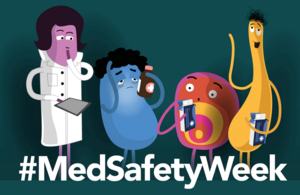MedSafetyWeek 2024: Preventing side effects
The ninth annual #MedSafetyWeek takes place this week, with regulators from 94 countries and 107 organisations taking part across the globe.

#MedSafetyWeek forms part of international efforts to raise awareness about the importance of reporting suspected side effects to national medicines regulatory authorities such as the Medicines and Healthcare products Regulatory Agency (MHRA).
This year’s campaign, which runs from 4 to 10 November, focuses on the importance of using medicines correctly to prevent side effects.
This means taking the right medicines, at the right time, in the right way and at the right dose, and carefully following instructions for use of medical devices. Following these steps can drastically reduce the risk of some side effects and safety issues.
When side effects do arise, this MedSafetyWeek, we ask that they are reported directly to the MHRA’s Yellow Card scheme and local reporting systems as soon as possible. Anyone can make a report: patients, parents, carers and healthcare professionals.
Reporting to the scheme allows the MHRA to not only identify new adverse effects but also gain more information about known adverse effects. This helps to improve the safety of medicines and healthcare products for all patients.
Safety concerns about medical devices, blood factor and immunoglobulin products, e-cigarettes and defective, low-quality or fake healthcare products should also be reported on the Yellow Card website.
This year’s MedSafetyWeek theme of ‘preventing side effects’ aligns with the third World Health Organization (WHO) Global Patient Safety Challenge: Medication Without Harm.
Preventable side effects contribute significantly to an increasing burden on patients and healthcare services, with studies consistently showing that between one third and a half may be potentially preventable.
Anticipating and managing side effects is key to reducing this burden and protecting patients from avoidable harm.
Please support #MedSafetyWeek by sharing, liking and reposting our social media posts:
Yellow Card scheme
In the UK, the MHRA’s Yellow Card scheme is a critical source of information for us as the regulator to monitor the safety of healthcare products once they are on the market.
Importantly, Yellow Card reports can help to identify previously unknown side effects – or adverse drug reactions (ADRs) – and provide new safety knowledge to ensure risk is minimised.
Examples include a report of a three-month-old baby who was prescribed Gaviscon Infant to manage reflux and two days later had severe constipation.
MHRA experts investigated the report and found six other reports of constipation with Gaviscon Infant in children. The ages of the patients varied between two weeks and nine months, except for one child who was a one-year-old.
As the medicine is indicated for children aged one to two years, it appeared that in the vast majority of these cases the product had been prescribed by a healthcare professional in an unapproved patient age group.
It was decided that regulatory action was needed to make the product information clearer with the relevant warnings and precautions.
More Yellow Card case studies can be found here
Yellow Card Biobank
The Yellow Card Biobank is an MHRA and Genomics England pilot project with the goal of increasing understanding of how a patients’ genetic makeup may increase their risk of side effects from prescribed medications.
The MHRA is currently looking for patients who have experienced severe skin reactions when taking allopurinol or severe bleeding when taking direct oral anticoagulants to join the study, before mid-January 2025.
If you or your patient have experienced a side effect to either of these drugs please complete a Yellow Card report. If you have any questions on the Biobank study, please email Yellowcardbiobank@mhra.gov.uk
Updates to this page
-
Updated article to add link for Yellow Card case studies
-
Updated to change date at top of page
-
First published.